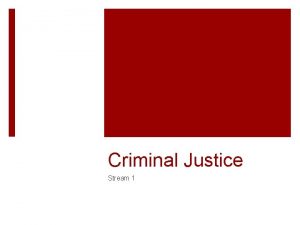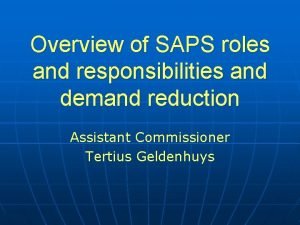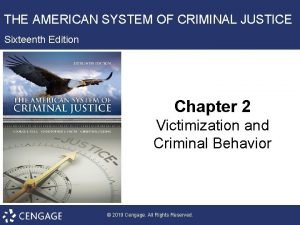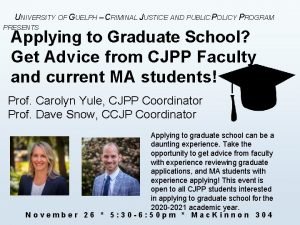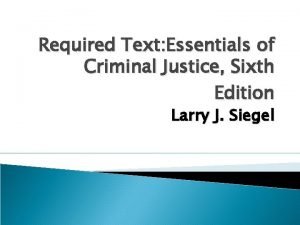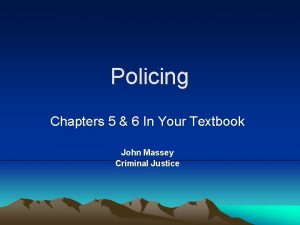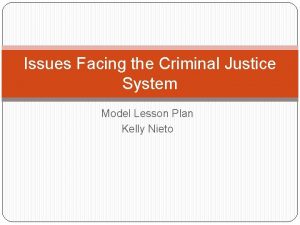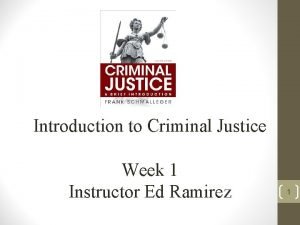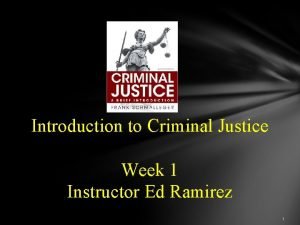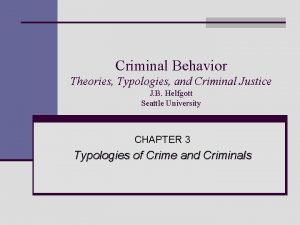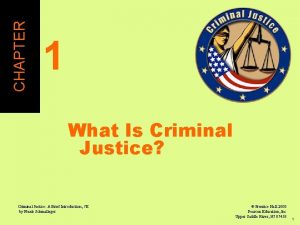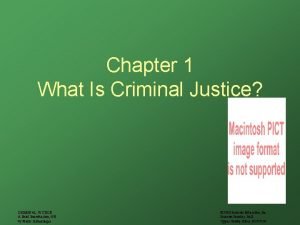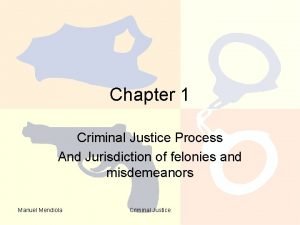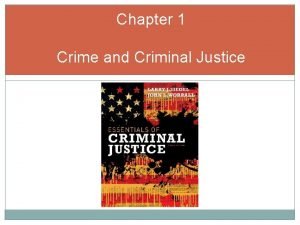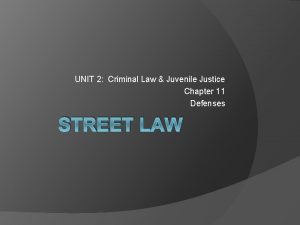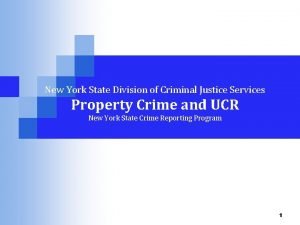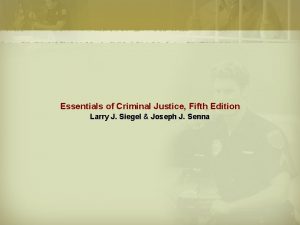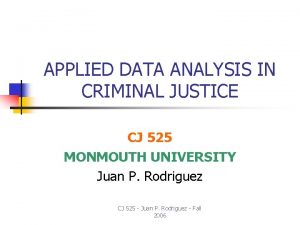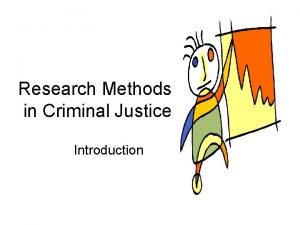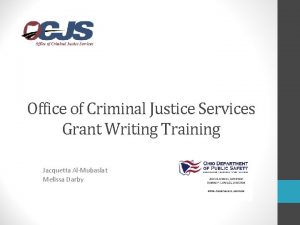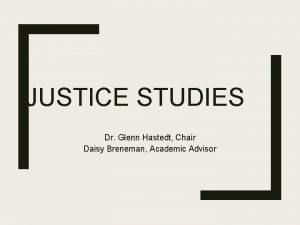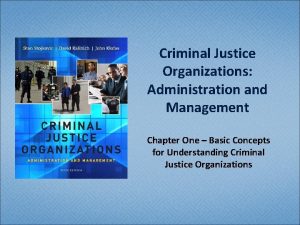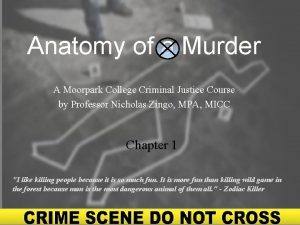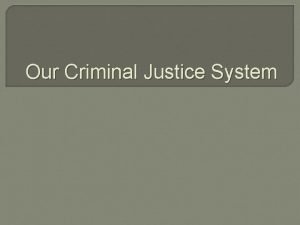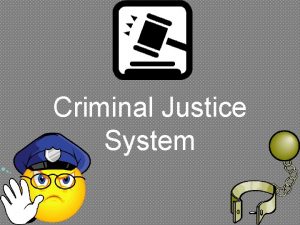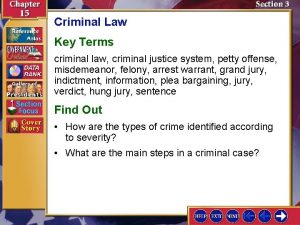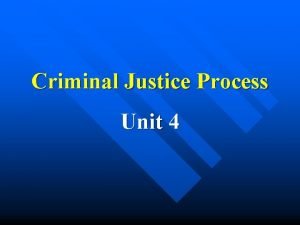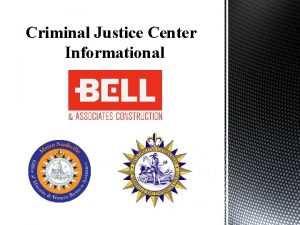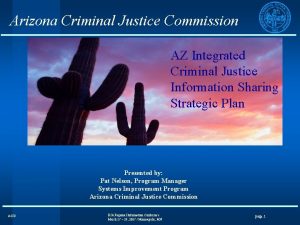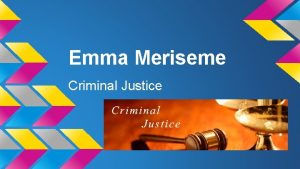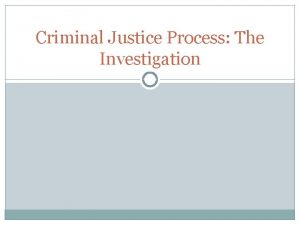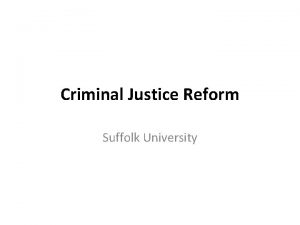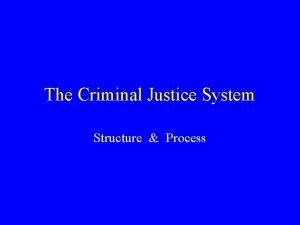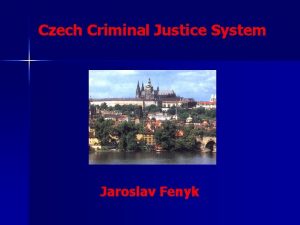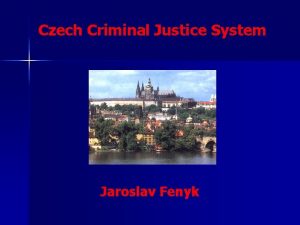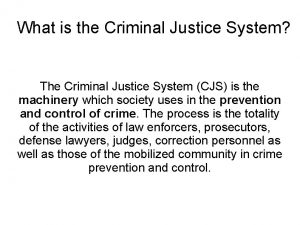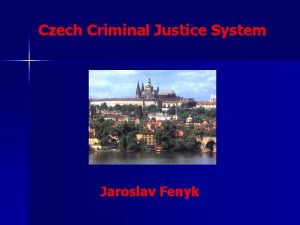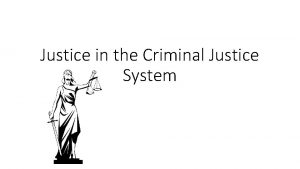Criminal Justice System What Is The Criminal Justice











































- Slides: 43

Criminal Justice System

What Is The “Criminal Justice System” Ø An elaborate apparatus that exists to enforce our criminal laws. Ø It is the official process whereby accused persons are: arrested, prosecuted, convicted, sentenced, punished.

Rule of Law legal The Rule of Law is a political and _______ principle stating that government must act ____ accordance in ______with established law and that governmental officers must not exceed their authority.

Basics of the Process ¨ Legislative – write the law ¨ Law Enforcement – arrest people who are suspected to have broken the law ¨ Judicial – “try” people who have been accused of breaking the law and decide guilt or innocence ¨ Corrections – incarcerate people found guilty; also probation/parole.

Goals and Objectives of Law Enforcement: ¨ Protect and Serve ¨ Repress Criminal and Delinquent Behavior ¨ Maintain Order and Public Peace ¨ Traffic flow and Collision Reduction – Enforcement – Education

Responsibilities of Law Enforcement: ¨ Familiarity with the Community and the Law – Know the elements of the crime – Gather information and evidence. ¨ Apprehend Offenders ¨ Testify in Court ¨ Regulate Non-Criminal Conduct

Adversarial System ¨ Also known as Prosecutor/Defense System – A defense attorney must zealously represent their client, irrespective of innocence or guilt. – A prosecutor must enforce the law by charging those who are suspected of having committed crimes to appear in court

Types of Prosecutors in Nevada ¨ Attorney General ¨ District Attorney ¨ City Attorneys ¨ Special Prosecutors

Types of Defense Attorneys ¨ Privately Retained-$$$ ¨ Public Defender-free to the Defendant; paid for by the taxpayers. – The Sixth Amendment to the U. S. Constitution provides: “In all criminal prosecutions, the accused shall enjoy the right. . . to have the Assistance of Counsel for his defence. ” – In all criminal actions where the defendant faces authorized imprisonment greater than one year

Defense Attorney’s Duties/Responsibilities Protect the rights of the accused ¨ ________ ¨ Force the prosecution, i. e. the government, to prove the accused’s guilt. ***Presumption of Innocence** – Raise every possible legal defense – Force the prosecution to follow the rules for admitting evidence, calling witnesses, asking questions, etc. ¨ Keep the client informed about available options – Enter into a plea bargain – Testify on own behalf

Nevada Court System ¨ Nevada Constitution establishes __ 3 levels of courts in Nevada: Court 1. Supreme _________ 2. _________ District Courts Justice Courts 3. ________ Ø Legislators may establish Municipal Courts within incorporated cities and townships

Nevada Court System Nevada Supreme Court: – decisionsby ____ lower courts when one of Review ____ the parties appeals. Does not pursue fact-finding by conducting trials – Determines whether legal errors were committed – Can affirm, modify, or reverse decisions –

The Supreme Court of Nevada

Nevada Court System District Courts: – Have general jurisdiction over all legal disputes – Courts where criminal, civil, family, and juvenile matters are generally resolved ____ through arbitration, mediation, and bench or jury trials – Judges also hear appeals from Justice and Municipal Court cases – 17 county courts in Nevada are divided into 9 Judicial Districts

Nevada Court System Justice Court: – Handle misdemeanor crime and traffic matters, small claims disputes, evictions, and other civil matters less than _____ $10, 000 – Preside over felony and gross misdemeanor arraignments – Conduct preliminary hearings to determine if sufficient evidence exists to hold criminals for trial at District Court

Nevada Court System Municipal Court: – Manage cases involving traffic violations and misdemeanors within city limits of ________ incorporated the ___________ municipalities

Statutes of Limitations ¨ Misdemeanor: ______ One (1) year Two (2) years ¨ Gross misdemeanor: _______ ¨ Felonies: ___________ Three-Four (3 -4) years Rape & Murder- no limit Exceptions: ___________

Crimes and Criminals ¨ Principal: Person involved before or during _______ the crime – NRS 195. 020 ¨ Accessory: Assist __________ after – NRS 195. 030

Classification of Crimes ¨ Crime: an act or omission _____by forbidden law punishable upon conviction by death, imprisonment, fine, or other discipline. § Every crime punishable by death or imprisonment is a Class A, B, C, D, or E _______ felony

Classification continued ¨ Gross misdemeanor: Every crime punishable by a fine of not more than $2, 000 or by imprisonment in a county jail, for not more than 1 year Ø Every other crime is a misdemeanor Ø Nevada does not have _____ infractions

Punishment of Felonies death Category A: Sentence of ____or _______ imprisonment in state prison for life Category B: Imprisonment in a state prison one (1) year with a not less than ______ maximum of not more than Twenty (20) years _________ Category C: Imprisonment in a state prison one (1) year with a for not less than ______ five (5) years maximum of not more than ______

Punishment of Felonies continued Category D: Imprisonment in a state prison one (1) year with a for not less than ______ maximum of not more than four ______ (4) years Category E: Imprisonment in a state prison one (1) year with a for not less than _______ maximum of _______ four (4) years

Correctional Agency Goals ¨ ______ Retribution - Punishment for its own sake (to pay back society) Deterrence to deter an individual from ¨ ______committing future crimes ¨ ______ Incarceration - “house” people to prevent offenders from committing more crimes ¨ Rehabilitation - correct, challenge behavior, reforming emphasis on _____

Prison ¨ Defined - “any place designated by law to keep persons held in custody under process of law or under lawful arrest. ” responsible to ______ maintain ¨ NDOC is ______ institutions to incarcerate and rehabilitate convicted felons

Probation ¨ Alternative to incarceration – Must submit to search – Must enter/complete counseling complete community service – Must _____ – Must pay fine/restitution – Must _____ from use, possession, control abstain drugs/alcohol.

Probation ¨ If term completed – no further action taken ¨ If violated during term, must serve original sentence. ¨ Terms – Gross Misdemeanors • Up to 3 years – Felony • Up to 5 years

Parole ¨ Alternative to continued incarceration – Remains under jurisdiction of Parole Board appointed governor ¨ Parole Board _____by ______ ¨ Must apply for Parole ¨ Inmates can request a Compassionate Release if they are close to dying from an illness

Criminal Justice System in Action ¨ Police conduct an investigation and either – Arrest on probable cause; or – If arrest not imminent, • DA or AG files a complaint in Justice Court along with an affidavit in support, to ask the Court to issue an arrest warrant; or • DA or AG presents an indictment to a Grand Jury, which will “bind the case over” if it finds probable cause.

Criminal Justice System in Action ¨ NRS 171. 178 First court appearance must 72 occur within ____hours – Defendant advised of: • • • Charges against them Right to remain silent Right to counsel Right of due process Reasonable bail Fair and speedy trial (except for capital offenses)

Criminal Justice System in Action ¨ If crime is Misdemeanor the defendant can: – Petition for attorney – Plead innocent – Plead guilty ¨ If the crime is a Gross Misdemeanor or Felony the defendant can: – Petition for attorney – Request preliminary hearing – Preliminary hearing used to determine slight or marginal evidence. – If evidence found, defendant bound over for trial – Plead innocent – Plead guilty

Criminal Justice System in Action ¨ Grand Juries – 12 Qualified jurors Indictment – Written Accusation “Bill of ______” – District Attorney must present exculpatory and inculpatory evidence – Defendant can testify

Criminal Justice System in Action ¨ District Court Trials – ____jurors 12 – Jury may be ____except for capital cases waived unanimous – Jury verdict must be ______

Criminal Justice System in Action ¨ Justice Court Trials – 6 member jury – Jury must be requested 30 days in advance ¨ Municipal Court Trials No – ____Jury

Federal Court System


Who exercises discretion? Name the Position: ¨ Enforce specific laws Police ¨ Investigate specific crimes ¨ Search people, vicinities, buildings ¨ Arrest or detain people

Who exercises discretion? Name the Position: ¨ File charges or petitions for adjudication ¨ Seek indictments ¨ Drop cases ¨ Reduce charges Prosecutor

Who exercises discretion? Name the Position: ¨ Set bail or conditions for release ¨ Accept pleas ¨ Determine delinquency ¨ Dismiss charges ¨ Impose sentence ¨ Revoke probation Judge/Magistrate

Who exercises discretion? Name the Position: ¨ Assign to type of correctional facility ¨ Award privileges ¨ Punish for disciplinary infractions while in custody Correctional Officer

Who exercises discretion? Name the Position: ¨ Determine date and conditions of parole ¨ Revoke parole Parole & Probation

¨ Right to be assumed innocent until proven guilty ¨ Right against unreasonable searches & seizures ¨ Right against arrest without probable cause ¨ Right against self-incrimination ¨ Right to fair questioning by police ¨ Right to protection from physical harm throughout the process ¨ Right to an attorney ¨ Right to trial by jury

¨ Right to know the charges ¨ Right to cross-examine witnesses ¨ Right to speak and present witnesses ¨ Right not to be tried twice for same offense ¨ Right against cruel & unusual punishment ¨ Right to due process ¨ Right to speedy trial ¨ Right against excessive bail & fines ¨ Right to be treated the same as others

QUESTIONS? ?
 Four pillars of criminal justice system
Four pillars of criminal justice system Arizona criminal justice information system
Arizona criminal justice information system Responsibilities and functions of saps
Responsibilities and functions of saps Criminal justice wedding cake
Criminal justice wedding cake The american system of criminal justice 16th edition
The american system of criminal justice 16th edition Mexico criminal justice system
Mexico criminal justice system Cjpp guelph
Cjpp guelph State of ct division of criminal justice
State of ct division of criminal justice Nonintervention perspective of criminal justice
Nonintervention perspective of criminal justice Grass eater vs meat eater police
Grass eater vs meat eater police Eighth amendment excessive bail
Eighth amendment excessive bail Consensus model criminal justice
Consensus model criminal justice Consensus model criminal justice
Consensus model criminal justice Criminal justice and corrections
Criminal justice and corrections Consensus model criminal justice
Consensus model criminal justice Behavioral theory in criminal justice
Behavioral theory in criminal justice Individual rights
Individual rights Consensus model criminal justice
Consensus model criminal justice Consensus model criminal justice
Consensus model criminal justice Nonintervention perspective of criminal justice
Nonintervention perspective of criminal justice Criminal law and juvenile justice unit 2
Criminal law and juvenile justice unit 2 Criminal justice wedding cake
Criminal justice wedding cake Nys division of criminal justice services
Nys division of criminal justice services National archive of criminal justice data
National archive of criminal justice data Criminal justice wedding cake diagram
Criminal justice wedding cake diagram Prioritiesed
Prioritiesed What is the purpose of intermediate sanctions
What is the purpose of intermediate sanctions Conflict theory criminal justice
Conflict theory criminal justice Data analysis in criminal justice
Data analysis in criminal justice Southern connecticut state university criminal justice
Southern connecticut state university criminal justice Inaccurate observation in criminal justice
Inaccurate observation in criminal justice Ocjs grants
Ocjs grants Daisy breneman jmu
Daisy breneman jmu Everyday ethics for the criminal justice professional
Everyday ethics for the criminal justice professional Management in criminal justice organizations
Management in criminal justice organizations Moorpark murder suicide
Moorpark murder suicide Hình ảnh bộ gõ cơ thể búng tay
Hình ảnh bộ gõ cơ thể búng tay Frameset trong html5
Frameset trong html5 Bổ thể
Bổ thể Tỉ lệ cơ thể trẻ em
Tỉ lệ cơ thể trẻ em Gấu đi như thế nào
Gấu đi như thế nào Chụp tư thế worms-breton
Chụp tư thế worms-breton Chúa yêu trần thế
Chúa yêu trần thế Các môn thể thao bắt đầu bằng từ đua
Các môn thể thao bắt đầu bằng từ đua
